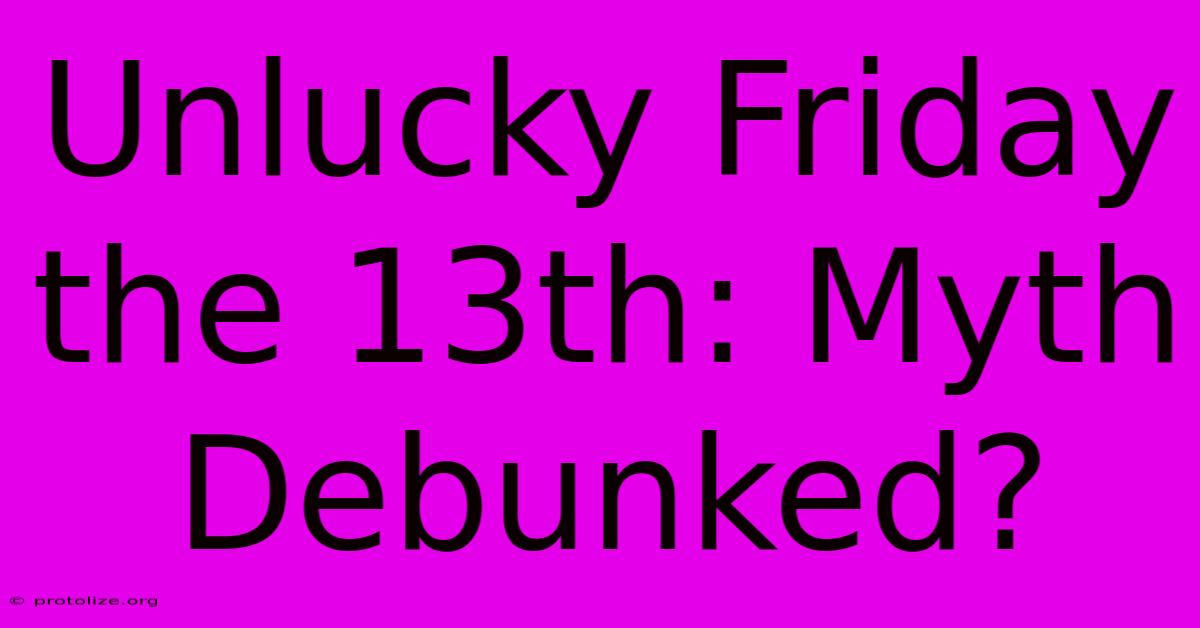Unlucky Friday The 13th: Myth Debunked?

Discover more detailed and exciting information on our website. Click the link below to start your adventure: Visit Best Website mr.cleine.com. Don't miss out!
Table of Contents
Unlucky Friday the 13th: Myth Debunked?
Friday the 13th. Just the phrase conjures images of black cats, broken mirrors, and impending doom. But is this pervasive superstition rooted in reality, or is it just a fun excuse to stay home and avoid any perceived bad luck? Let's delve into the history and psychology behind this enduring myth and see if we can debunk the "unlucky" aspects.
The Origins of the Fear: A Historical Perspective
While the association of the number 13 with misfortune is ancient, spanning various cultures and religions, the specific pairing with Friday is a more recent development. Some historians trace it back to the crucifixion of Jesus, believed to have occurred on a Friday. Others point to the Knights Templar, a powerful religious order dissolved and persecuted on Friday, October 13, 1307. These historical events, combined with existing numerological anxieties surrounding the number 13, likely contributed to the negative connotations.
The Number 13: A Global Phobia (Triskaidekaphobia)
The fear of the number 13, or triskaidekaphobia, is a well-documented phenomenon. Many buildings skip the 13th floor in their numbering, and some people actively avoid activities on the 13th of any month. This inherent fear creates a self-fulfilling prophecy; if you believe something bad will happen, you might subconsciously act in ways that increase the likelihood of a negative outcome. This psychological effect significantly influences the perception of Friday the 13th.
The Psychology of Superstition: Why We Believe
Our brains are wired to seek patterns and connections, even where none exist. This cognitive bias, known as confirmation bias, leads us to remember instances that confirm our beliefs (e.g., something bad happened on a Friday the 13th) while ignoring instances that contradict them. This selective memory strengthens our superstitious beliefs, making them incredibly resilient to rational counterarguments.
The Power of Suggestion and Social Influence
The widespread belief in Friday the 13th is also a testament to the power of social influence. The constant media attention and cultural reinforcement of this myth perpetuate the fear. If everyone around you believes something is unlucky, you're more likely to believe it too. This collective belief creates a powerful social construct that shapes our behavior and perceptions.
Friday the 13th: Fact vs. Fiction
Statistically speaking, there's no evidence to suggest that Friday the 13th is any more dangerous or unlucky than any other day. Accident rates, crime rates, and other metrics don't show a significant increase on these days. The perceived bad luck is purely a matter of perception and psychological bias.
The Benefits of Debunking the Myth
Understanding the psychological roots of Friday the 13th allows us to challenge our own beliefs and overcome irrational fears. By recognizing the power of confirmation bias and social influence, we can make more conscious and rational choices, free from the constraints of superstition.
Conclusion: Embrace the Day, Not the Fear
While Friday the 13th may hold a certain cultural fascination, it's ultimately a myth. There's no inherent bad luck associated with this specific day. By understanding the historical and psychological underpinnings of this superstition, we can break free from its grip and embrace Friday the 13th – or any day – with a more rational and positive outlook. So, go ahead and have a productive and enjoyable day, regardless of the date! Don't let a superstitious belief dictate your experience.

Thank you for visiting our website wich cover about Unlucky Friday The 13th: Myth Debunked?. We hope the information provided has been useful to you. Feel free to contact us if you have any questions or need further assistance. See you next time and dont miss to bookmark.
Featured Posts
-
Biden Could Commute More Sentences
Dec 13, 2024
-
Biden Commutes 1 500 Sentences
Dec 13, 2024
-
2024 Goty Astro Bot Wins
Dec 13, 2024
-
Europa League Tottenham Rangers Match
Dec 13, 2024
-
Gukesh Defeats Ding Liren New Record
Dec 13, 2024
